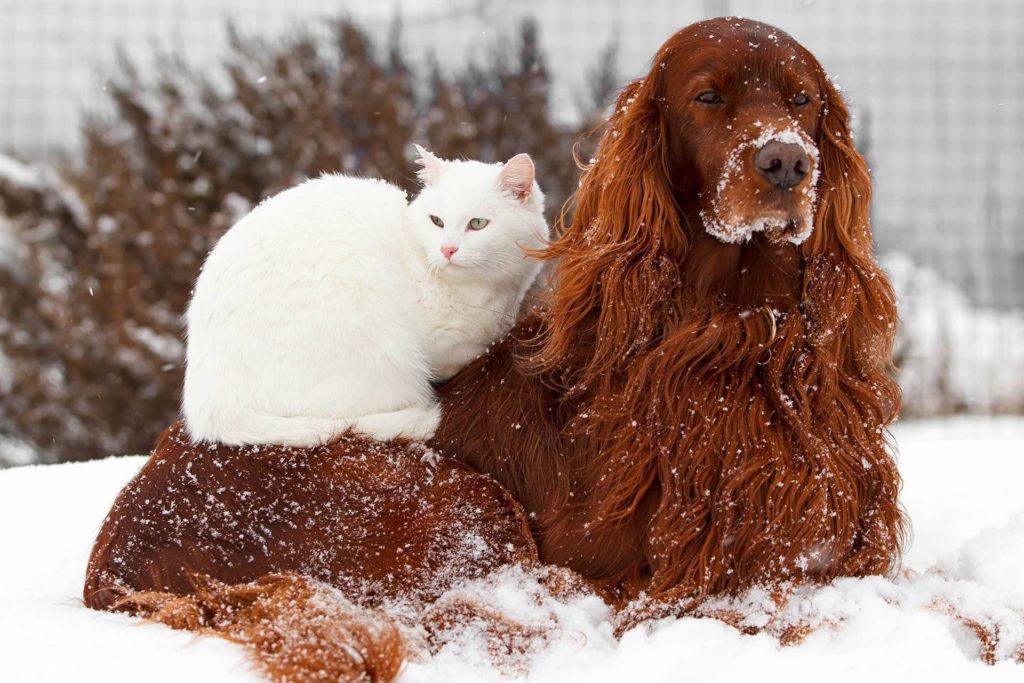Pennsylvania state officials are urging the public to take extra precautions to ensure the safety of their pets during a dangerous cold snap across much of the state over the next few days.
“While it’s easy to think that dogs are immune to cold because of their fur, the fact is that more dogs perish in the winter than at any other time of the year,” said Joel Hersh, executive director of the Pennsylvania State Animal Response Team (PASART.) “Some are better able to handle the cold than others, but a taking a few simple precautions can ensure an enjoyable winter experience for both pets and their people.”
 Beware of cold temperatures. Many pets can be safe in outside temperatures with proper shelter, but puppies, smaller dogs, older dogs and cats should not be left outdoors when the temperature falls below 40 degrees.
Beware of cold temperatures. Many pets can be safe in outside temperatures with proper shelter, but puppies, smaller dogs, older dogs and cats should not be left outdoors when the temperature falls below 40 degrees.
Provide a protective shelter. If your dog or cat stays outside much of the time in the winter, his shelter needs to be raised a couple of inches off the frozen ground or concrete. The inside needs to have a blanket, cedar shavings or straw which should be changed frequently to keep him warm and dry. Add a flap to the door, and face the shelter away from the weather. The size of the shelter should be large enough so your pet can sit and stand, but small enough so his body heat will be retained in the house. Use a plastic water bowl to ensure your pet’s tongue does not get stuck to cold metal, and change the water often to keep it from freezing.
Keep older, arthritic pets inside. These animals should not be left outside under any circumstances. Escort the older dog outside for toileting and use a leash if the yard has ice or snow. Older dogs can easily fall and seriously injure themselves.
Watch for signs of frostbite and injury. Dogs’ ears, paws and tails are especially susceptible to frostbite. If you suspect frostbite, contact your veterinarian. If your dog plays on ice or hard, frozen dirt, his paws are susceptible to cuts as his paws slide across these rough surfaces. Always wipe your dog’s feet after a walk in the snow to remove ice balls and salt deposits from the road. Salt irritates a dog’s paws and can be toxic if ingested. Use only pet-safe ice melt.
Keep an eye out for hypothermia. If you notice shivering, lethargy, low heart rate and unresponsiveness, bring your pet into a warm area, place a light blanket over him, and call your veterinarian.
Eliminate the possibility of poisoning. Unfortunately, dogs like the sweet taste of antifreeze, which can cause sickness or even death if ingested. Make certain that all antifreeze containers are well out of reach of dogs and thoroughly clean any spills immediately.
Keep your dog on a leash. Dogs rely heavily on a strong sense of smell to figure out where they are and can easily get lost during winter storms. Snow covering the ground will make their surroundings less familiar. Keeping your dog on a leash at all times – especially during winter storms – can help stop your dog from becoming lost. Also talk to your veterinarian about micro-chipping your dog, just in case.
Don’t leave your dog inside of a parked car. Most people know this rule for the summer. A parked car can quickly amplify the effects of extreme weather. During the winter it can act as an icebox and trap cold air inside.
The commonwealth’s ReadyPA campaign encourages citizens to take three basic steps before an emergency occurs to ensure the safety of all family members: Be Informed, Be Prepared, Be Involved. More detailed information, including downloadable emergency kit checklists and emergency plan templates, is available online at www.ReadyPA.org.
About CARTs: County Animal Response Teams (CARTs) were formed as an initiative of the PA State Animal Response Team (PASART), a private non-profit organization which receives the majority of its funding from the federal government through the PennsylvaniaEmergency Management Agency (PEMA). CARTs consists of volunteers from all walks of life – from experienced emergency responders, veterinary technicians, animal trainers and handlers to other men and women concerned with the welfare of animals. CARTs are based on the principals of the Incident Command System developed by the Federal Emergency Management Agency (FEMA), and involve a coordinated effort of government, corporate and animal organizations. For more information regarding Pennsylvania CARTS visit www.pasart.us.


1 Comment
I agree with you content, This is especially important if they spend extended time outside. The additional exertion for warmth means they are burning more calories.